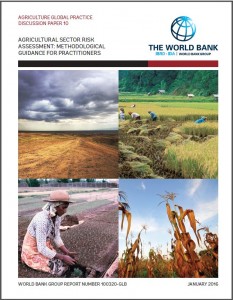
In the agricultural sector, risks are inherent and ubiquitous, posing potentially serious consequences for stakeholders and consumers. Risks disrupt supply chains, causing extensive financial and economic losses. Agricultural risks are also the principal cause of transient food insecurity, creating a poverty trap for millions of households across the developing world that enforces a vicious cycle of shock and recovery. Climate change is exacerbating this cycle by shifting the frequency and intensity of weatherrelated risks and increasing uncertainty.
Source: FARM-D
Effective agricultural risk management (ARM) is crucial to increasing economic growth, improving food security, and reducing poverty. Although levels of risk vary within and between countries, lower-income and highly agriculture-dependent countries are more vulnerable to agriculture-related risks. In these countries, there is an urgent need to better assess risks, understand the interconnections between di ff erent types of risk, and improve agricultural risk management strategies.
The report
The World Bank’s conceptual framework for agricultural risk management looks at risk from an integrated perspective. The framework views agricultural sector risk assessment (ASRA) as a tool to help decision makers understand risk exposure and to provide the basis for developing appropriate risk management solutions. ASRA is a consultative, time-bound process that provides an orderly way to analyze, identify, and prioritize risks. The process facilitates risk management policy and program design by providing a framework and tools for decision making. The target audience includes country-level stakeholders involved in selected agricultural commodity systems, development agency decision makers, and developing country policy makers.
This report provides methodological guidance for conducting an ASRA. The guidance is based on the World Bank’s Agriculture Risk Management Team’s experience assisting governments in conducting sector and key commodity supply chain risk assessments in more than 20 countries. The document contains practical guidance on the complexities of developing a holistic ASRA and provides a stepwise approach to conducting ASRAs, incorporating the lessons learned from assisting countries in mainstreaming risk management practices into mid-term development strategies and investments. Over time, the methodologies and tools have been refined, but the focus remains on approaching risks and risk management through an integrated perspective.
The Webinar
On March 1st, 2016 at 9:00 am EDT, Senior Economist Vikas Choudhary will discuss and answer questions about the World Bank’s Agricultural Risk Management Team’s (ARMT) latest publication Agricultural Sector Risk Assessment: Methodological Guidance for Practitioners. The new report contains practical guidance on holistic risk assessment and provides a stepwise approach to conducting risk assessments. The guidance is geared toward development practitioners working in the agricultural sector in developing countries.
Incorporating the lessons learned from assisting countries in mainstreaming risk management practices into mid-term development strategies and investments, Mr. Choudhary will share ARMT’s experience conducting assessments in more than 20 countries. Over time, the methodologies and tools have been refined, but the focus remains on approaching risks and risk management through an integrated perspective.
Webinars on Webex:
Meeting number: 667 574 708
Meeting password: farmd123
About the speaker
Vikas Choudhary is a Senior Economist in the World Bank’s Global Food and Agriculture Practice (GFADR). He manages the operations of the Agricultural Risk Management Team (ARMT). Prior to joining the World Bank, he was a Director of Global Economic Developement at the Center of High Impact Philanthropy at the University of Pennsylvania. He started his career with the Government of Rajasthan and subsequently worked with CARE-India, set up a USAID project value chain project, and started a felt export business.

